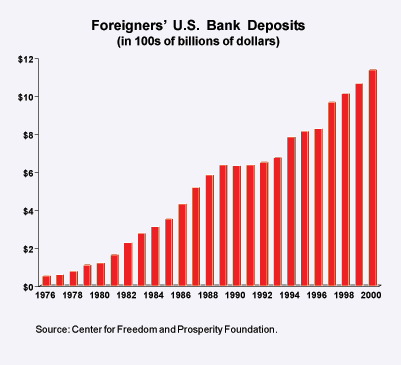Foreigners have invested more than $1 trillion in capital in the United States since 1984, when Congress and the Reagan administration established a policy of not taxing interest they earn on U.S. bank deposits. This influx of capital will be jeopardized if a proposed Internal Revenue Service rule is implemented. The regulation (133254-02) would require banks to report interest paid to nonresident aliens, although their deposits are not subject to U.S. taxes. This would harm America's economy and undermine the competitiveness of U.S. financial institutions. The price is high, especially given that the IRS does not have the authority to issue this rule.
IRS Abuse of Its Regulatory Authority.
Executive branch agencies and departments are supposed to issue regulations that implement laws enacted by Congress. More specifically, the IRS is supposed to promulgate regulations that help enforce U.S. tax law. Since the United States government does not tax bank deposit interest paid to nonresident aliens, the IRS does not need to collect this information. Indeed, the IRS admits that the purpose of this regulation is to help foreign governments tax the income their citizens earn in the United States.
The IRS Is Flouting the Law.
Congress has examined the tax treatment of indirect foreign investment on several occasions. The desire to attract capital has always led lawmakers to decide not to tax or require reporting of bank deposit interest paid to nonresident aliens. The proposed IRS regulation, however, seeks to overturn the outcome of this democratic process. This would undermine the rule of law and President Bush's efforts to rein in regulatory abuses.
Capital Will Flee American Banks.
As the Figure shows, the current tax and privacy rules for foreign investors have been a huge success, attracting about $1 trillion to U.S. financial institutions. These funds finance car loans, home mortgages and small business expansion in America. If the regulation is approved, however, foreigners will shift a substantial share of their funds to London, Hong Kong and other jurisdictions that protect investors' interests.
U.S. Banks Will Be Less Competitive.
Financial institutions around the world compete for liquid capital. American banks have successfully competed, but this profitable source of deposits will become very unstable if banks are forced to put foreign tax law above U.S. tax law. Money will flow out of America, making it more difficult for U.S. banks to meet the challenge of foreign competition. The economic loss would be substantial; Stephen Entin of the Institute for Research on Economics of Taxation estimates the regulation would annually cost $80 billion in lost output, or 0.8 percent of U.S. gross domestic product.
Banks' Paperwork Burden Will Increase.
The IRS asserts that the total regulatory burden on financial institutions will increase by only 500 hours. This estimate is absurdly low. To read and interpret the rule, seek appropriate legal and accounting advice and report on thousands of accounts will surely impose a far greater burden.
The Rule Is Bad Tax Policy.
The IRS regulation is a slap in the face of tax reformers. All proposals to fix the tax code, such as the flat tax, are based on common-sense principles such as taxing income only once and taxing only income inside our borders. But the new regulation would sabotage tax reform by helping foreign governments double-tax income earned in America.
For example, the European Union would like the United States to join a cartel for the purpose of double-taxing cross-border savings. The Bush administration has rejected the EU request, but the IRS rule undermines that position. In fact, the EU considers the proposed regulation supportive of its cartel.
The Required Cost-Benefit Analysis Was Not Performed.
The IRS is ignoring laws requiring cost-benefit analysis of proposed regulations. It has effectively exempted itself from regulatory oversight by incorrectly declaring most of its regulations either "interpretative" within the meaning of the Administrative Procedure Act or not "major" within the meaning of Executive Order 12866. Yet many IRS regulations impose significant economic costs and should be subject to regulatory review.
International Competition for Capital Will Be Undermined.
Collecting private financial information on nonresident investors and sharing that data with foreign governments hinders jurisdictional competition. It enables high-tax governments to impose levies on income earned outside their borders, particularly discriminatory taxes on capital. Thus the regulation would encourage governments to increase marginal tax rates on mobile capital.
The Rule Differs Little from the Clinton Administration's Proposal.
The current version of the regulation is a slight modification of a rule proposed in the waning days of the Clinton administration. The original proposal required reporting deposit interest paid to all nonresident aliens, but intense opposition led to its withdrawal in the summer of 2002. The IRS immediately issued the new version, which limits information collection to residents of 15 developed countries, including some EU members. However, it is clear that the IRS intends to eventually extend the regulation to citizens of all nations.
The Regulation Violates the Treasury Department's Position on Information-Sharing.
The regulation is also contrary to the administration's position on the treatment of confidential taxpayer information. On several occasions, former Secretary Paul O'Neill and other Treasury officials stated that the U. S. government does not support automatic information sharing. Rather, O'Neill said information should only be provided on a case-by-case basis in response to specific requests – and with full respect for due process and individual privacy. The proposed rule clearly violates this commitment, since any information collected would be automatically forwarded to foreign governments.
Conclusion.
The proposed IRS regulation is bad tax policy and bad regulatory policy. It is inconsistent with President Bush's tax reform agenda. And it will hurt the U.S. economy by reducing the capital available for workers, consumers, homeowners and entrepreneurs. The rule would become effective following its final publication in the Federal Register. Instead, it should be withdrawn by the Treasury Department.
Andrew F. Quinlan is president of the Center for Freedom and Prosperity, a nonprofit organization that seeks to promote economic prosperity by advocating competitive markets and limited government.